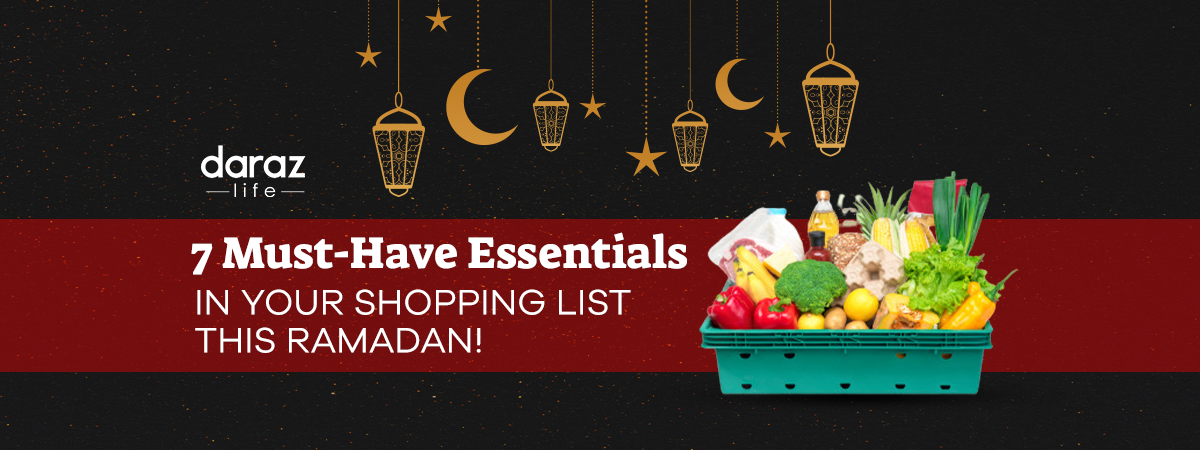
7 Must-Have Essentials in your Shopping List this Ramadan!
Ramadan is meant to refresh the soul and body, but in our region, more often than not we end up with a few extra pounds by the time Eid comes around. Fried food and sweet treats, especially at iftar, leaves us feeling bloated, while having a quick and unhealthy suhoor keeps us thirsty throughout the day. During the 12-hour-long, (very) hot fasts this year, it’s essential that we eat the right food items to stay hydrated and energized the whole month—and so that we don’t have to alter our Eid dress at the last minute.
Here’s a list of some of the top essentials your shopping list NEEDS this Ramadan!
Dates
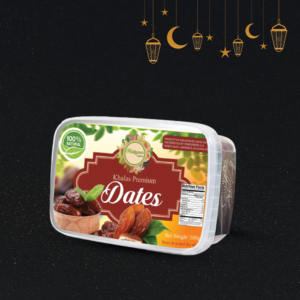
Dates are an integral part of this month; luckily for us, the dates brought to Sri Lanka are among the best. They are a good source of vitamins, minerals, energy, sugar, and fiber. It’s customary to break the fast with a date but what most people don’t know is that it is also advised to eat them at suhoor. They might be tiny in size but they fill you up longer than you would expect and are a good option for satisfying your sweet tooth. Among the many varieties of dates, Ajwa, said to be the “dates from paradise” and found mostly in Saudi Arabia, are good for protection against heart ailments and an excellent option for both suhoor and iftar. A yummy way to stay energized throughout the day.
Low Sugar fruits
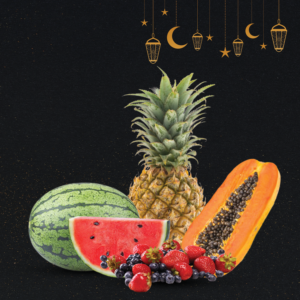
Fruits are universally known as healthy due to being high in fiber and enzymes. Not only that, but fruits can prevent constipation and help keep you hydrated. All types of fruit are great during Ramadan but some deserve a special mention, including papaya. Sweet in taste, they are found easily in the markets and have terrific nutritional values: rich in fiber, low in calories, less sugar content, improves digestion, great for hair and skin…need we go on?
The other fruit that we cannot stress enough is great for Ramadan (and summer in general) is watermelon—a sweet, cooling, beautiful source of hydration. We know that the iftar spreads usually include scrumptious desserts, but instead of reaching for that kunafa or luqaimat (which yes, is momentarily delicious but will leave you thirsty and full of calories), have a bowl (or two) full of watermelon. Packed with antioxidants, this wonder fruit will leave you feeling light and refreshed.
Rice
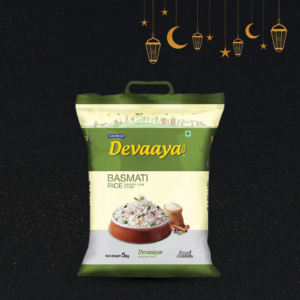
Another staple you need on your table this Ramadan is rice. An integral ingredient in porridges ( Kanji ) and also popular amongst many families for Sahoor. Sticking to your usual meals, which is your everyday rice and curry for Sahoor and Ifthar also helps to maintain a steady diet and avoid the motherly evil that is fried food. If you do want a healthier option, then red rice or quinoa are stellar substitutes and the best way to go.
Leafy Greens
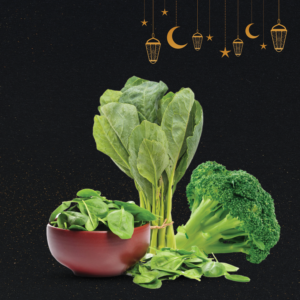
Yes, Ramadan is a reason to indulge, but don’t stop eating your greens just because you’re fasting. If you need convincing, then know that leafy greens are actually calming on your stomach after a long day of fasting. Especially post-iftar, when you’re not very hungry but would like to munch on something, light salads are ideal snacks. They’re packed with flavor and have plenty of greens to give you fiber (easy on the olive oil dressing). Feel free to be creative so that you don’t feel like eating a salad is a chore. Add mango, watermelon, pomegranate seeds, or strawberries (a handful of feta cheese on top never hurt anybody).
Moreover, since leafy greens are packed with fiber, make sure to pick wisely. As too much fiber can be hard to digest. Some recommendations: pre-packed salads, spinach, bittergourd, and broccoli.
Nuts and Seeds
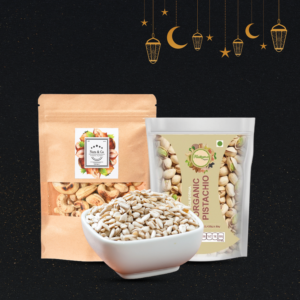
Nuts and seeds contain a variety of healthy nutrients that can positively affect your brain, your heart, and even your waistline. Just one ounce of nuts a day can diminish inflammation by providing your body with immune-boosting minerals.
If you’re bored of peanuts or almonds, then switch it up. Opt for cashews, macadamias, pistachios, pecans, pumpkin seeds, sunflower seeds. These make for a great snack during Sahoor and can actually help in keeping you full for the day.
Root vegetables
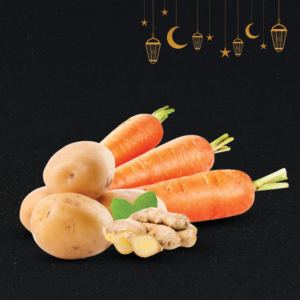
Did you know that root vegetables are some of the most nutrient-dense vegetables in the world? This is because root vegetables can directly absorb large amounts of nutrients from the soil. While each root vegetable contains its own set of health benefits. A high concentration of antioxidants and iron are overlapping benefits. They are filled with slow-burning carbohydrates, too, meaning you feel full quicker and for longer. Carrot, radish, potato, yam, and ginger are a few examples of root vegetables to get you started.
Protein
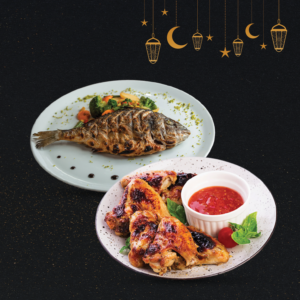
Who doesn’t like kebabs? Proteins are essential, especially when you open your fast. You need something that sends a message to your brain: yes, I’ve had a proper meal. Grilled chicken, baked fish, scrumptious kebabs are all excellent sources of protein, giving you energy.
Make note that the reason why we keep stressing to avoid fried food isn’t just to cut back the calories. But to save you from feeling more thirsty than usual during your fast and to prevent heartburn after iftar. Leftover chicken or meat is great for sandwiches at suhoor time, not to mention easy to whip up when you miss your alarm and wake up late.
To shop all the essentials you need to store for yourself this Ramadan, shop on dMart. dMart features all the products your kitchen needs from canned goods to fresh vegetables. Shop on the Daraz app to get the best deals on all your groceries! Download the app now.
